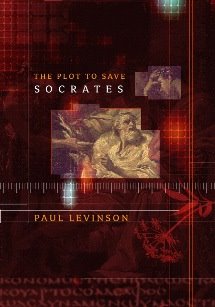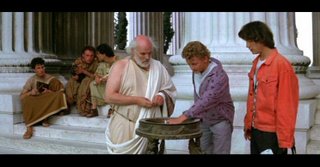 Still, I took note of a magazine blurb reviewing The Plot to Save Socrates by Paul Levinson because it addressed a subject I'd toyed with before: time travel in the hands of respectful historians. I had a similar story idea -- mine had graduate students using some ill-described device to collect lost primary sources, until it all went to hell -- but I could never get it to work.
Still, I took note of a magazine blurb reviewing The Plot to Save Socrates by Paul Levinson because it addressed a subject I'd toyed with before: time travel in the hands of respectful historians. I had a similar story idea -- mine had graduate students using some ill-described device to collect lost primary sources, until it all went to hell -- but I could never get it to work.I'm not entirely sure this book gets it right either, but it was fun to read, and just academic enough to minimize my guilt. Set in 2042, it describes a graduate student who receives a seemingly genuine ancient Greek manuscript from her mentor, who subsequently disappears. The manuscript is a dialogue between Socrates and an unknown traveler who seems to know about time travel and cloning. (He says he is from somewhere near Ithaca and Syracuse. Socrates remarks those cities aren't close in his time.) So she travels back and forth through time to accomplish a job that several of Socrates' own followers failed to do.
 A good time travel story should have a user-friendly device, like the DeLorean from the Back to the Future trilogy. The Terminator movies kept its technology vague; all you know is that the future beings enter the present day naked. Timeline used a complicated process that transfers the traveler's genetic material like a fax machine; again, vague. While I like the phone booth from Bill and Ted's Excellent Adventure -- hidden in plain sight during the present day, but accessible to those who know how to use it -- it, like the DeLorean, does not blend into the past.
A good time travel story should have a user-friendly device, like the DeLorean from the Back to the Future trilogy. The Terminator movies kept its technology vague; all you know is that the future beings enter the present day naked. Timeline used a complicated process that transfers the traveler's genetic material like a fax machine; again, vague. While I like the phone booth from Bill and Ted's Excellent Adventure -- hidden in plain sight during the present day, but accessible to those who know how to use it -- it, like the DeLorean, does not blend into the past.Give Levinson credit for a truly inspired mechanism: it basically amounts to a set of deluxe chairs, but they're kept in a pair of exclusive gentleman's clubs in New York and London that have been around forever. They're designed to travel through time, but not space, so while the New York chairs can go back a few centuries, those who go to London can go back much further, and end up in Londinium. The creation of these chairs is never fully explained, but they appear to spring from a combination of ancient know-how and futuristic materials.
I also appreciate all the dry research that went into a grand-scale escapist adventure, populated with a nice mix of famous and marginally famous figures. There's some genuine mystery (who wrote the manuscript, and what happened to the mentor?) and some decent twists in resolution. Eventually, we meet Socrates, and learn from him what we already knew: he loves San Dimas.

9 comments:
It's computers! Everything's bigger...yet smaller!
And he loves to pick up chicks with Billy the Kid, until that geek Sigmund Freud screws it all up!
Mike: "San Dimas high school football rules!"
Quinn: You remembered me! I looked back; you hadn't commented since Akeelah and the Bee. Prequels got you down?
The crappest time travel ´device´ ever to appear in a movie has to be the diary in ´The Butterfly Effect´, which in addition must have the most lazily constructed time travel plot ever.
The Prequels are complete, surprisingly! We're on to new, post-Return of the Jedi material. Also, by way of excuses, I was on a research trip, which you (as a law-type) might find vaguely interesting. Or not.
So the time traveling professor is from Cornell? Or perhaps SUNY Buffalo? Cute.
Rob: Ashton Kutcher + drama = didn't see it. But I like the diary as a flashback device (or portable pensieve) in Harry Potter and the Chamber of Secrets.
Oscar: the 2042 stuff is set in New York City, and the mysterious traveler in the manuscript (named Andros) is presumably describing NYC by using ancient place names (like Ithaca and Syracuse) as points of reference.
Bill and Ted rock. My favorite movie heros EVAH.
Hey Bill! Member when you asked my mom to the prom?
"Shut up, Ted!"
Post a Comment